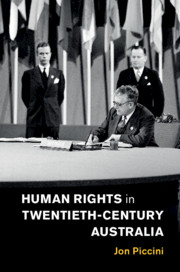Book contents
- Human Rights in Twentieth-Century Australia
- Human Rights in History
- Human Rights in Twentieth-Century Australia
- Copyright page
- Dedication
- Contents
- Acknowledgements
- Introduction: Bereft of Words
- 1 Inventing Rights
- 2 Cold War Rights
- 3 Experimental Rights
- 4 Whose Rights?
- 5 Implementing Rights
- Epilogue: Cascade or Trickle?
- Index
3 - Experimental Rights
Published online by Cambridge University Press: 20 September 2019
- Human Rights in Twentieth-Century Australia
- Human Rights in History
- Human Rights in Twentieth-Century Australia
- Copyright page
- Dedication
- Contents
- Acknowledgements
- Introduction: Bereft of Words
- 1 Inventing Rights
- 2 Cold War Rights
- 3 Experimental Rights
- 4 Whose Rights?
- 5 Implementing Rights
- Epilogue: Cascade or Trickle?
- Index
Summary
The 1960s were a decade of disappointment and depression for human rights activists. Yet, while far from a dominant framework, diverse Australians found that their needs to reorient or intervene in domestic political realities aligned with particular readings of the UDHR’s universalism. Human rights served as a way of reconceptualising socialism in an advanced capitalist democracy like Australia, recasting the Communist Party of Australia as defenders and extenders of the rights it had long dismissed as bourgeois. The seemingly monolithic power of the Australia’s Returned Servicemen’s League was shaken by a group claiming to be human rights’ true advocates by supporting those whose consciences were being trampled by conscription. Amnesty International's uptake was quick in Australia, but the nascent group’s novel reading of human rights posed as many challenges as it did opportunities, leading to often-public internal disputes over the limits of human rights as domestic political tools. The questions these groups posed – did the enjoyment of rights result from a citizen’s compact with the state, granting rights and the compulsion to obey, or universal and inhering in the individual through a relationship with god or an inalienable secular conscience? – proved central in decades to come.
Keywords
- Type
- Chapter
- Information
- Human Rights in Twentieth-Century Australia , pp. 86 - 118Publisher: Cambridge University PressPrint publication year: 2019

